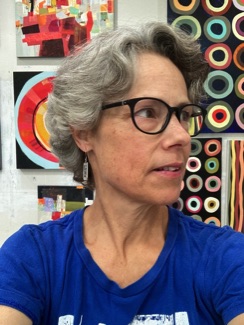but I treat painting and drawing the same way. Whatever the visual elements, my first impulse is to jam them together and force them to negotiate. Will they get along? Argue? Resist each other?
In some of my work the appearance of randomness - as if all the elements washed up on a beach together in a haphazard arrangement - speaks to me. However, each work is carefully constructed, composed, and revised many times to achieve the suggestion that the elements have fallen in place by chance.
In other series I impose a more formal layout, like stripes, concentric circles, and grids, for example. In this approach the contrast between the regularity of the format and the variety of the elements is what speaks to me.
Random bits and pieces, accidental arrangements, and formal layouts: why do these fascinate me? I think it’s because to me they suggest a way that we make sense of the world. We string together bits of experience and information and arrange them in ways that create meaning we can live with. In this way, our experience is a creative act itself, though not usually conscious. This phenomenon is also exemplified in the way memories collide in our brains and get morphed into narratives that aren’t necessarily literally true, but have some emotional truth or metaphorical truth. This is what excites me about art making: the possibility of squeezing some deeper truths - symbolic, pictorial, visual, emotional, or metaphorical - out of bits of paper and paint, and creating new narratives.
Bio
Jane Davies is a full-time painter. Beginning as a potter in the early nineties, Davies transitioned into freelance art, using painting and collage as her medium. Since 2010 she has been teaching abstract painting workshops in North America and online, as well as making art full time. She has written five instructional books, produced one instructional DVD, and offers many demonstration videos on social media.
Artist's Statement
I like rounding up strays and feeding them all at the same trough to see what happens. In art, this means collecting visual elements - lines, shapes, colors, etc. - and seeing what they do together on the canvas. Collage especially lends itself to this approach because it is a more literal picking up of pieces,
